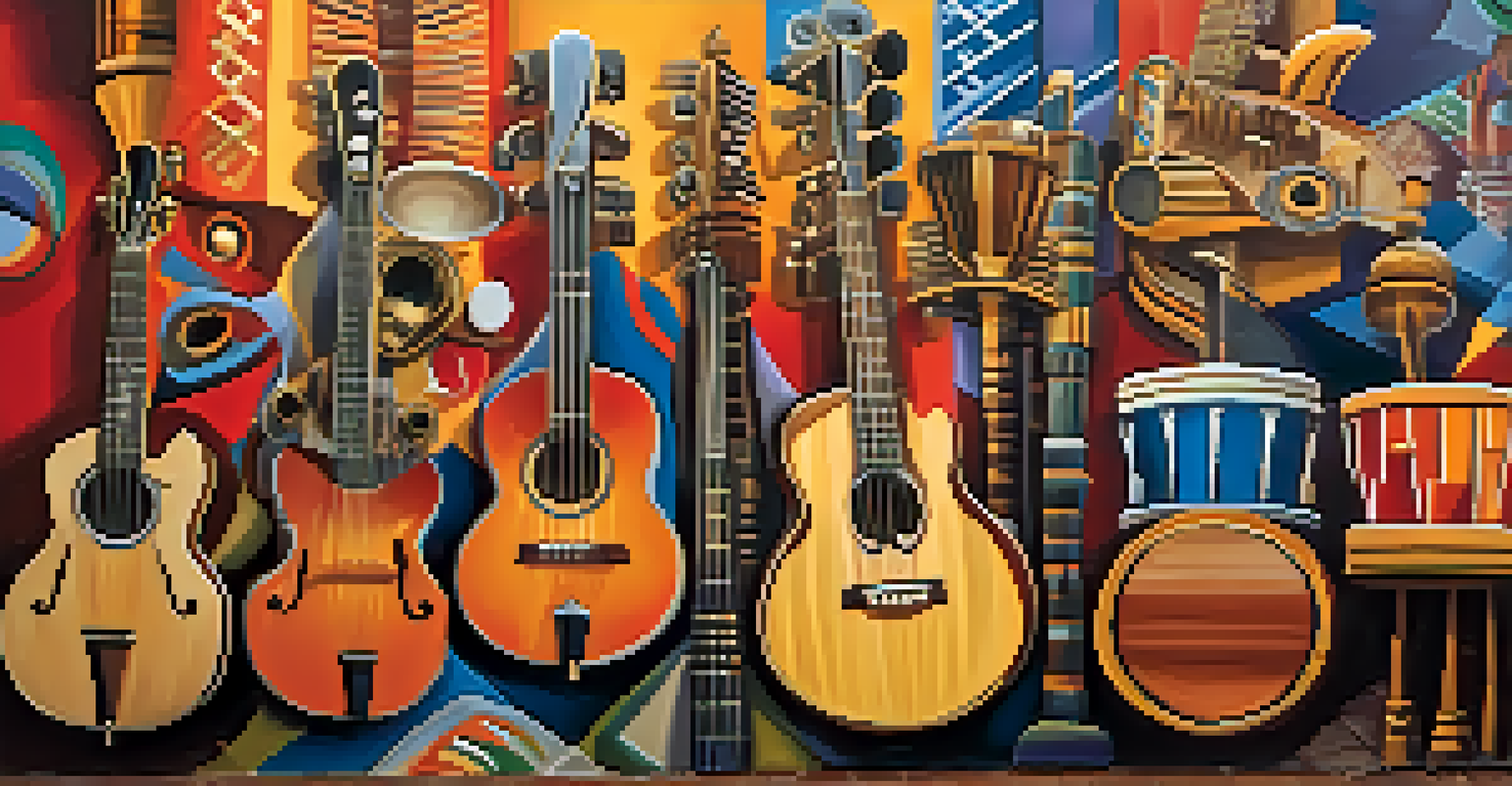The Role of Music in Cultural Identity Formation

Understanding Cultural Identity and Its Importance
Cultural identity refers to the feeling of belonging to a particular group, shaped by shared experiences, traditions, and values. It is essential because it helps individuals understand their place in the world and fosters a sense of community. Without a strong cultural identity, individuals may struggle to connect with others, leading to feelings of isolation.
Music is the shorthand of emotion.
Music plays a pivotal role in this identity formation. It transcends language barriers and evokes emotions that can resonate deeply with personal and collective histories. For many, music is a soundtrack to life events, embedding itself in memories and shaping how cultural narratives are expressed.
As we explore further, we will see how music not only reflects cultural identities but also actively participates in their formation. This complex relationship highlights the importance of music as a cultural artifact, a means of communication, and a tool for social cohesion.
Music as a Reflection of Cultural Values
Music often mirrors the values and beliefs of a culture, acting as a window into its soul. For instance, traditional folk songs can convey stories of resilience, love, and hardship, encapsulating the essence of a community's experiences. This reflection allows individuals to connect with their heritage, reinforcing cultural pride.

Moreover, genres like hip-hop, reggae, or indigenous music often emerge from specific social contexts, highlighting struggles for justice, equality, and identity. These musical expressions serve as powerful narratives that can inspire change and foster solidarity among marginalized communities. They help articulate shared experiences and aspirations.
Cultural Identity Shapes Community
Cultural identity fosters a sense of belonging and community, helping individuals connect with shared experiences and values.
As we delve into the relationship between music and cultural values, it becomes evident that music is not just entertainment; it is a vital means of cultural expression. It allows individuals to engage with their history and present, making it an essential component of cultural identity.
The Role of Music in Community Bonding
Music has an incredible ability to bring people together, fostering a sense of belonging and community. Events like concerts, festivals, and communal singing create shared experiences that strengthen social ties. These gatherings often become pivotal moments in the formation of cultural identity, where individuals feel connected to one another.
Without music, life would be a mistake.
In many cultures, music is an integral part of rituals and celebrations, serving as a catalyst for unity. For example, weddings, funerals, and festivals often feature music that resonates with collective memory, reinforcing shared values and traditions. This communal experience helps individuals feel anchored in their cultural identity.
As we explore the communal aspects of music, we see that it goes beyond personal expression. It serves as a social glue, binding individuals together and fostering a collective identity that can withstand the test of time.
Music and Intergenerational Cultural Transmission
Music acts as a bridge between generations, facilitating the transmission of cultural knowledge and practices. Older generations often pass down musical traditions, stories, and values to younger ones, ensuring that cultural identities remain vibrant and relevant. This intergenerational exchange helps maintain a sense of continuity and belonging.
For instance, grandparents might share traditional songs with their grandchildren, teaching them about their heritage while fostering familial bonds. These moments not only enrich the younger generation's understanding of their culture but also reinforce the identity of the older generation as custodians of tradition.
Music Reflects Cultural Values
Music serves as a mirror to cultural beliefs, encapsulating community experiences and reinforcing cultural pride.
As we consider the role of music in this transmission process, it becomes clear that it serves as a living archive of cultural identity. Through music, traditions evolve while remaining rooted in their historical context, helping individuals navigate their cultural landscape.
The Impact of Globalization on Cultural Music
Globalization has significantly influenced how cultures interact, leading to the blending of musical styles and identities. While this fusion can create exciting new genres, it may also pose challenges to the preservation of traditional music. For example, as Western pop music becomes more dominant worldwide, local music traditions may struggle to maintain their unique identities.
However, globalization can also foster cross-cultural collaborations that enrich musical landscapes. Artists from diverse backgrounds can come together, creating innovative sounds while promoting cultural exchange. This interaction can enhance cultural understanding and appreciation, allowing for a more inclusive representation of identity.
As we examine the effects of globalization on music, we see both opportunities and challenges. The dynamic interplay between local and global influences continues to shape cultural identities in new and exciting ways.
The Role of Music in Social Movements
Music has a long history of serving as a powerful tool for social movements, helping to articulate collective grievances and aspirations. From protest songs during the Civil Rights Movement to anthems for environmental causes, music often embodies the spirit of activism. It rallies individuals around common goals and ignites passion for change.
For example, songs like 'We Shall Overcome' became synonymous with the struggle for civil rights, uniting people in a shared fight for justice. These musical expressions not only provided comfort and motivation but also helped to shape cultural identity around social causes.
Music Unites Generations and Movements
Through intergenerational transmission and social movements, music acts as a vital tool for preserving cultural identity and inspiring collective action.
As we explore music's role in social movements, it becomes evident that it is more than just a soundtrack. Music can inspire action, foster solidarity, and ultimately contribute to the formation of cultural identities that reflect a commitment to social justice.
Personal Identity and Music Preferences
Our personal music preferences often reflect our cultural identities and experiences. The genres we gravitate toward can signal our values, beliefs, and even social circles. For instance, someone who enjoys traditional folk music may feel a strong connection to their cultural roots, while others drawn to contemporary pop might embrace a more globalized identity.
Moreover, the music we listen to can influence how we perceive ourselves and relate to others. It can shape our moods, inspire creativity, and even guide our social interactions. As such, our personal music choices become integral to our sense of identity and community.

In examining the connection between personal identity and music preferences, we see how deeply intertwined they are. Music not only reflects who we are but also helps us navigate our place in the world and the cultures we engage with.